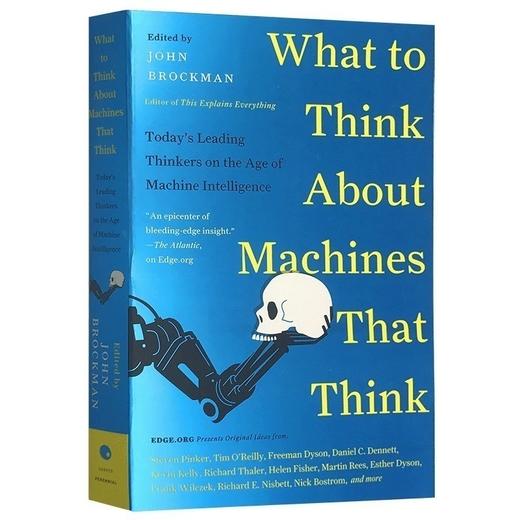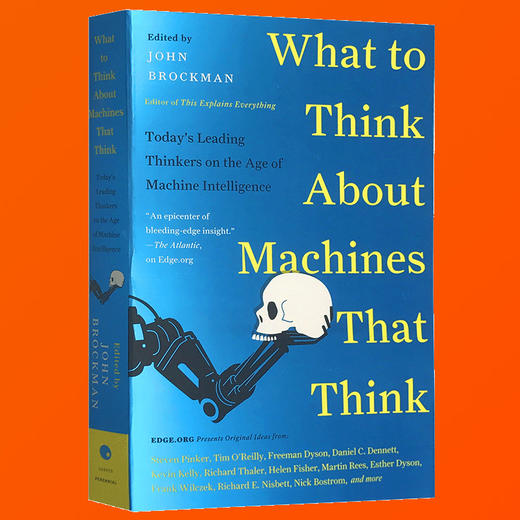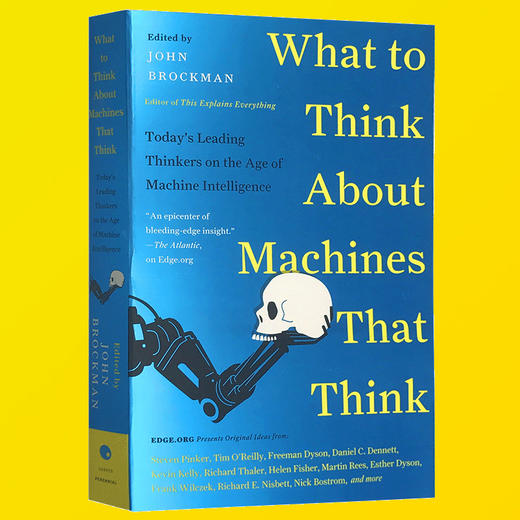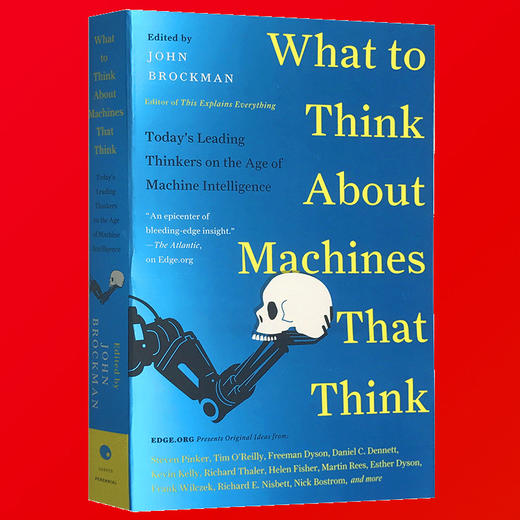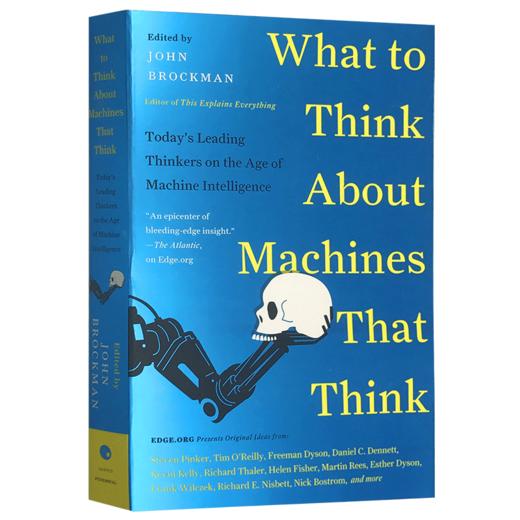如何思考会思考的机器 英文原版科普书 What to Think About Machines That Think John Brockman 英文版原版进口书
| 运费: | ¥ 0.00-999.00 |
| 库存: | 2 件 |
商品详情
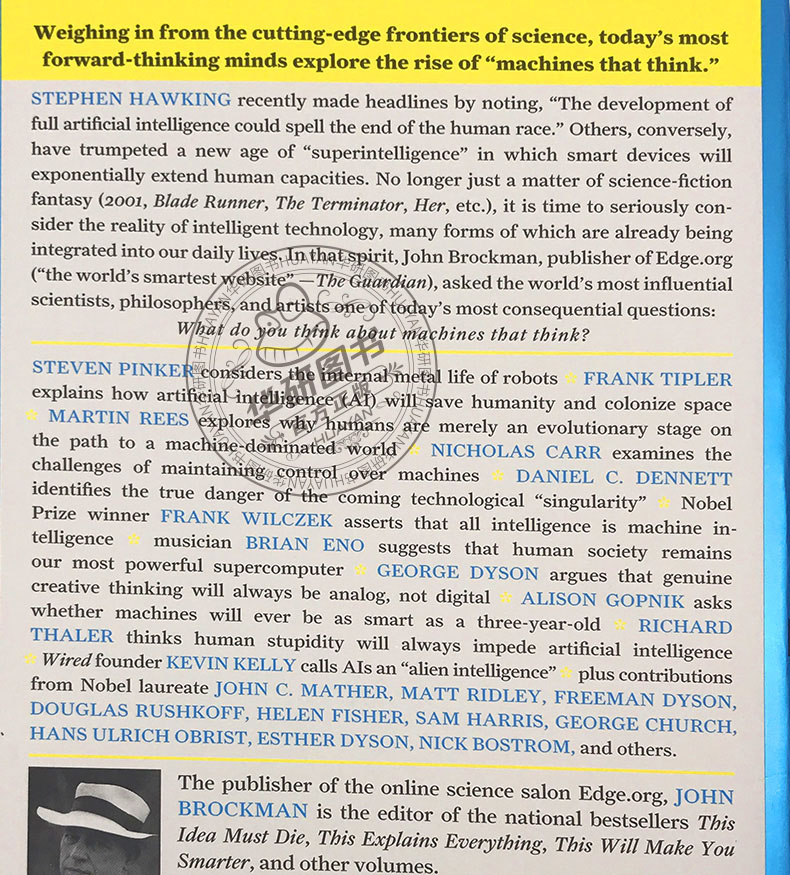



 书名:What to Think About Machines That Think如何思考会思考的机器
书名:What to Think About Machines That Think如何思考会思考的机器
作者:John Brockman
出版社名称:Harper Perennial
出版时间:2015
语种:英文
ISBN:9780062425652
商品尺寸:13.5 x 2.3 x 20.3 cm
包装:平装
页数:576 ★世界上聪明的网站Edge,让100位拥有伟大头脑的科学家坐在同一张桌子旁,共同解答关乎人类命运的同一个大问题,为你开启一场智识的探险,一次思想的旅行!
★世界上聪明的网站Edge,让100位拥有伟大头脑的科学家坐在同一张桌子旁,共同解答关乎人类命运的同一个大问题,为你开启一场智识的探险,一次思想的旅行!
★带你认识当今世界聪明的科学家和思想家,了解这些“精英头脑”一年一度的思维大爆炸。
★洞悉复杂、聪明的头脑正在思考的“大问题”,从而开启你的脑力激荡。
★直达物理宇宙、生命科学、人工智能、网络趋势、认知神经和心理学等领域的前列,让你与世界聪明的头脑保持同步运转!
★财讯传媒集团首席战略官段永朝、北京大学新闻与传播学院教授胡泳、驭势科技(北京)有限公司联合创始人兼CEO吴甘沙、电子科技大学教授周涛、中国科学院国家天文台研究员授苟利军、丁香园创始人李天天、财新传媒主编王烁、清华大学社会科学学院教授刘兵、复旦大学经济学助理教授兰小欢、2016年雨果奖获得者郝景芳联袂推荐!
★《全球概览》创始人斯图尔特·布兰德、“虚拟现实之父”杰伦·拉尼尔、《纽约时报》、《卫报》、《华尔街日报》、《大西洋月刊》集体盛赞!
Weighing in from the cutting-edge frontiers of science, today’s most forward-thinking minds explore the rise of “machines that think.”
Stephen Hawking recently made headlines by noting, “The development of full artificial intelligence could spell the end of the human race.” Others, conversely, have trumpeted a new age of “superintelligence” in which smart devices will exponentially extend human capacities. No longer just a matter of science-fiction fantasy (2001, Blade Runner, The Terminator, Her, etc.), it is time to seriously consider the reality of intelligent technology, many forms of which are already being integrated into our daily lives. In that spirit, John Brockman, publisher of Edge. org (“the world’s smartest website”— The Guardian), asked the world’s most influential scientists, philosophers, and artists one of today’s most consequential questions: What do you think about machines that think?
Review
“Once again, cultural wizard John Brockman has stirred up the intellectual waters with a provocative question, designed to tease the best out of intellectuals. ... Excellent.” — New Scientist
“An immeasurably stimulating read... exploring the intersection of science, philosophy, technology, ethics, and psychology to unravel some of the most important questions worth asking.” — BrainPickings
“Lively. ... A satisfying experience for readers looking for thoughtful answers to big questions.”— Kirkus
“Another stimulating read from Brockman and company.” — Shelf Awareness
 如何思考会思考的机器?What to Think About Machines That Think《如何思考会思考的机器》编者约翰·布罗克曼召集了世界知名的科学家和思想家来回答这个“大问题”,并把他们的答案和论述集结成书。
如何思考会思考的机器?What to Think About Machines That Think《如何思考会思考的机器》编者约翰·布罗克曼召集了世界知名的科学家和思想家来回答这个“大问题”,并把他们的答案和论述集结成书。
这本书将带你认识这些“伟大的头脑”,看他们在思考什么样的问题,从而开启你的脑力激荡。他们都是各个领域的“科学明星”,包括全球大数据权威阿莱克斯·彭特兰、世界语言学家史蒂芬·平克、生物地理学家贾雷德·戴蒙德、互联网思想家凯文·凯利、《全球概览》创始人斯图尔特·布兰德等。
智能机器真的会思考吗?
智能机器会进化出人类级别的智能,并超越其人类制造者吗?
未来某日,强人工智能是否会发动“权力之战”,将人类驱逐出权力中心?
人类是否会和人工智能和谐共处,实现人机大融合?
诸如此类的问题,你会在本书中找到属于自己的答案。
Weighing in from the cutting-edge frontiers of science, today’s most forward-thinking minds explore the rise of “machines that think.”
Stephen Hawking recently made headlines by noting, “The development of full artificial intelligence could spell the end of the human race.” Others, conversely, have trumpeted a new age of “superintelligence” in which smart devices will exponentially extend human capacities. No longer just a matter of science-fiction fantasy (2001, Blade Runner, The Terminator, Her, etc.), it is time to seriously consider the reality of intelligent technology, many forms of which are already being integrated into our daily lives. In that spirit, John Brockman, publisher of Edge. org (“the world’s smartest website”— The Guardian), asked the world’s most influential scientists, philosophers, and artists one of today’s most consequential questions: What do you think about machines that think?
 约翰·布罗克曼,是美国著名的文化推动者、出版人,“第三种文化”领军人;也是“世界上聪明的网站”(《卫报》赞誉)Edge的创始人。他旗下汇集了一大批世界知名的科学家和思想家,每年就同一话题进行跨学科讨论。
约翰·布罗克曼,是美国著名的文化推动者、出版人,“第三种文化”领军人;也是“世界上聪明的网站”(《卫报》赞誉)Edge的创始人。他旗下汇集了一大批世界知名的科学家和思想家,每年就同一话题进行跨学科讨论。
The publisher of the online science salon Edge.org, John Brockman is the editor of Know This,This Idea Must Die,This Explains Everything,This Will Make You Smarter, and other volumes. Just suppose we could endow a machine with human-level intelligence, that is to say, with the ability to match a typical human being in every (or almost every) sphere of intellectual endeavor, and perhaps to surpass every human being in a few. Would such a machine necessarily be conscious? This is an important question, because an affirmative answer would bring us up short. How would we treat such a thing if we built it? Would it be capable of suffering or joy? Would it deserve the same rights as a human being? Should we bring machine consciousness into the world at all?
Just suppose we could endow a machine with human-level intelligence, that is to say, with the ability to match a typical human being in every (or almost every) sphere of intellectual endeavor, and perhaps to surpass every human being in a few. Would such a machine necessarily be conscious? This is an important question, because an affirmative answer would bring us up short. How would we treat such a thing if we built it? Would it be capable of suffering or joy? Would it deserve the same rights as a human being? Should we bring machine consciousness into the world at all?
The question of whether a human-level AI would necessarily be conscious is also a difficult one. One source of difficulty is the fact that multiple attributes are associated with consciousness in humans and other animals. All animals exhibit a sense of purpose. All (awake) animals are, to a greater or lesser extent, aware of the world they inhabit and the objects it contains. All animals, to some degree or other, manifest cognitive integration, which is to say they can bring all their mental resources—perceptions, memories, and skills—to bear on the ongoing situation in pursuit of their goals. In this respect, every animal displays a kind of unity, a kind of selfhood. Some animals, including humans, are also aware of themselves—of their bodies and the flow of their thoughts. Finally, most, if not all, animals are capable of suffering, and some are capable of empathy with the suffering of others.
In (healthy) humans, all these attributes come together as a package. But in an AI they can potentially be separated. So our question must be refined. Which, if any, of the attributes we associate with consciousness in humans is a necessary accompaniment to human-level intelligence? Well, each of the attributes listed (and the list is surely not exhaustive) deserves a lengthy treatment of its own. So let me pick just two—namely, awareness of the world and the capacity for suffering. Awareness of the world, I would argue, is indeed a necessary attribute of human-level intelligence.
Surely nothing would count as having human-level intelligence unless it had language, and the chief use of human language is to talk about the world. In this sense, intelligence is bound up with what philosophers call intentionality. Moreover, language is a social phenomenon, and a primary use of language within a group of people is to talk about the things they can all perceive (such as this tool or that piece of wood), or have perceived (yesterday’s piece of wood), or might perceive (tomorrow’s piece of wood, maybe). In short, language is grounded in awareness of the world. In an embodied creature or a robot, such an awareness would be evident from its interactions with the environment (avoiding obstacles, picking things up. and so on). But we might widen the conception to include a distributed, disembodied artificial intelligence equipped with suitable sensors.
- 华研外语 (微信公众号认证)
- 本店是“华研外语”品牌商自营店,全国所有“华研外语”、“华研教育”品牌图书都是我司出版发行的,本店为华研官方源头出货,所有图书均为正规正版,拥有实惠与正版的保障!!!
- 扫描二维码,访问我们的微信店铺
- 随时随地的购物、客服咨询、查询订单和物流...
